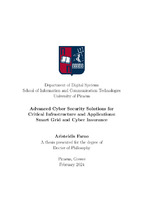Advanced cyber security solutions for critical infrastructure and applications : smart grid and cyber insurance

Doctoral Thesis
Author
Farao, Aristeidis
Φαραώ, Αριστείδης
Date
2024-02Advisor
Xenakis, ChristosΞενάκης, Χρήστος
View/
Keywords
Security solutions for critical infrastructure ; Cybersecurity ; Cyberinsurance ; Smart grid security ; Ασφάλεια κρίσιμων υποδομών ; Ασφάλεια στον κυβερνοχώρο ; Ασφάλιση στον κυβερνοχώρο ; Ασφάλεια σε έξυπνα δίκτυαAbstract
The rapid digitization of critical infrastructure, coupled with the increasing
sophistication of cyber threats, has elevated the importance of robust cybersecurity
measures. This dissertation explores the multifaceted realm of cyber
defense within the context of critical infrastructure, focusing specifically on
the interplay between advanced cyber security solutions, smart grid technology,
and the emerging field of cyber insurance. The research begins by
dissecting the vulnerabilities inherent in smart grid systems, which form the
backbone of modern energy distribution networks. Through a comprehensive
analysis of cyber threats targeting smart grids, the study identifies potential
attack vectors and assesses the implications of successful breaches on the reliability
and resilience of critical energy infrastructure. Subsequently, a range
of advanced cyber security solutions is evaluated, encompassing cutting-edge
technologies such as artificial intelligence, machine learning, and blockchain,
in order to fortify the defenses of smart grid ecosystems. In parallel, the
dissertation delves into the evolving landscape of cyber insurance as a risk
management strategy for critical infrastructure. Investigating the intricacies
of underwriting policies and the quantification of cyber risks, the research elucidates
the role of cyber insurance in incentivizing proactive cyber hygiene
and fostering a culture of resilience among infrastructure stakeholders. The
study also explores the challenges associated with the integration of cyber insurance
into existing risk management frameworks and proposes strategies to
optimize its efficacy. Furthermore, the dissertation offers a synthesized perspective
by examining the synergies between advanced cyber security solutions
and cyber insurance. It investigates how a holistic approach, combining
technological fortification and financial risk mitigation, can elevate the overall
cybersecurity posture of critical infrastructure. Case studies and real-world
examples illustrate the practical implementation of these integrated strategies,
providing valuable insights for industry practitioners and policymakers
alike. In conclusion, this dissertation contributes to the academic discourse
on cybersecurity for critical infrastructure by offering a comprehensive examination
of advanced solutions tailored to the unique challenges posed by
smart grid ecosystems. By exploring the symbiotic relationship between technological
fortifications and financial risk mitigation through cyber insurance,
this research provides a roadmap for enhancing the cyber resilience of critical
infrastructure in the face of evolving cyber threats.


